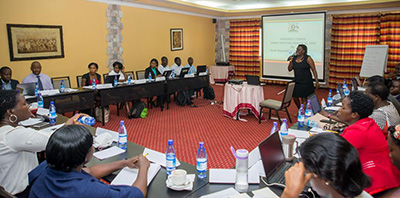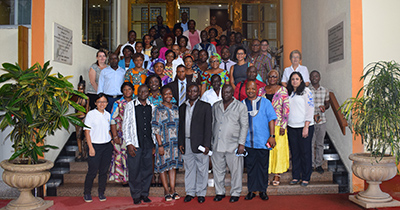Multi-Sectoral Anemia Efforts at the National Level in Uganda
Executive Summary

Anemia, a widespread public health problem, affects nearly 25 percent of the world’s population and undermines countries’ progress in health and economic development.

Anemia, a widespread public health problem, affects nearly 25 percent of the world’s population and undermines countries’ progress in health and economic development.

Anemia, a widespread public health problem, affects nearly 25 percent of the world’s population and undermines countries’ progress in health and economic development.
SNV, November 2017.
As part of Sierra Leone’s efforts to build a multisectoral platform to address anemia, SPRING has been providing support to draft the Sierra Leone National Multi-Sectoral Strategy to Prevent and Control Anemia. This is the first strategy developed in Sierra Leone to specifically address anemia. The working group focused on priority actions for anemia prevention and control that it felt needed to be improved or scaled up.
On September 7, SPRING/Ghana hosted a Learning and Sharing Event to reflect on the life of the project. Staff shared project successes, lessons learned, and recommendations for moving forward with USAID, Ghanaian officials, and local NGOs.
Read more about the event in our news item.
SPRING hosted a learning event at the National Press Club to share key lessons learned and results achieved with our partners over the past six years, along with a wide range of tools developed to strengthen evidence-based nutrition programming.
Download the Agenda (PDF, 304 KB)
SPRING developed the District Assessment Tool for Anemia (DATA) to assist countries in strengthening anemia programming at the district level. DATA helps districts determine factors contributing to anemia in their specific setting, identifies enablers and barriers to addressing anemia, and offers guidance for prioritizing interventions and actions to strengthen anemia-related programming.
Anemia is a widespread public health problem (table 1) that few countries have been able to reduce in compliance with World Health Assembly goals (figure 1). Anemia is characterized by a low concentration of hemoglobin in the blood and results in poor health and decreased economic development. For expectant mothers, serious maternal anemia increases the risk of mortality and morbidity. For children, it can mean low birth weight, prematurity, and impaired physical and cognitive development.
Food and Nutrition Technical Assistance (FANTA) Project, September 2017.
SPRING is proud to participate in the International Congress of Nutrition taking place in Buenos Aires, Argentina from the 15th to the 20th October 2017. Below you will find a summary of the symposia and sessions where SPRING is involved.